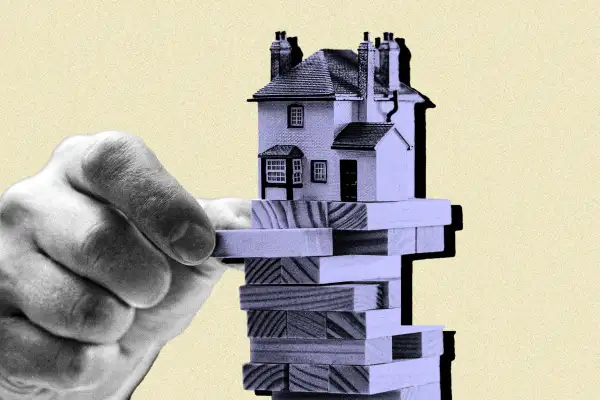Are Soaring Home Insurance Costs Pushing Homeowners Into Foreclosure?

Foreclosure filings are rising in several Southern cities vulnerable to major storms, and the rising cost of home insurance has been blamed for the financial distress on homeowners.
In Houston, foreclosure filings in the first quarter were up 36.5% year over year, according to data from ATTOM. Other large increases were documented in Orlando (28.1%), Tampa (20.9%) and Miami (18.8%).
In an article analyzing the ATTOM foreclosure data, Bloomberg reported that higher insurance costs and rising property taxes are likely reasons for the increase in foreclosure filings.
The recent surge in home insurance costs has also been linked to foreclosures in cities like New Orleans, where representatives of Habitat for Humanity, a nonprofit that builds homes for low-income people, say more than 100 residents are facing foreclosure as premiums have skyrocketed, even doubling for some of the affected homes in a two-year period.
Overall in the U.S. home insurance costs have risen 20% since 2021 to an average of $2,377 in 2023 and are expected to increase another 6% to $2,522 in 2024, according to Insurify, an online marketplace.
Rising home insurance costs could lead to foreclosures
A large body of research shows that unexpected changes in monthly budgets are the “big impetus for foreclosure,” according to Benjamin Collier, associate professor of risk management and insurance at Temple University.
That could be someone becoming unemployed or having a sudden health shock, he says. But when foreclosure filings rise sharply in a city or region, the cause is usually more systemic.
“We're seeing consumers experiencing rising [insurance] costs, and in some cases, costs notably higher than they expected when they were buying that home initially. In some of these examples, insurance prices are going up 25% year on year for a couple of years in a row,” Collier says.
While he says researchers are still early in the process of investigating the impacts of rising home insurance costs on American households, the surge appears to be a likely culprit for the increase in foreclosures in certain cities.
Beyond the South, foreclosure filings are also up sharply in some large California cities like San Francisco (39.9%) and Sacramento (32.1%), though home insurance is generally much cheaper out West.
This year, the average insurance policy is expected to cost $11,759 in Florida, $7,809 in Louisiana and $4,437 in Texas, according to Insurify. While California’s home insurance marketplace has had its share of issues, with some insurers leaving the state due to heightened wildfire risk, the average cost is only expected to be $1,921 in 2024.
Rob Barber, CEO at ATTOM, tells Money it’s still not clear why foreclosure filings are rising in certain cities.
“These trends may be due to nothing more than lenders with backlogs that are now being filed in court, leading to increases in activity,” he says.
However, Barber ran through some of the factors he thinks are not to blame for rising foreclosures. For example, unemployment and home equity issues aren’t particularly pronounced in the affected cities. “Property tax increases also don't provide much of a clue,” he says. “Average property taxes went up by less than $50 per month (or declined) in all 12 of the metropolitan statistical areas (MSAs) on the list with foreclosure increases.”
Here’s that list of cities, consisting of the 12 metros with the largest increases in foreclosures filings out of the 25 areas with the most filings in the first quarter of 2024:
- Boston-Cambridge-Newton, Massachusetts-New Hampshire — 1,086 filings (+47.8%)
- San Francisco-Oakland-Hayward, California — 1,188 filings (+39.9%)
- Houston-The Woodlands-Sugar Land, Texas — 3,020 filings (+36.5%)
- Sacramento--Roseville--Arden-Arcade, California — 811 filings (+32.1%)
- Orlando-Kissimmee-Sanford, Florida — 1,403 filings (+28.1%)
- Tampa-St. Petersburg-Clearwater, Florida — 1,426 filings (+20.9%)
- Miami-Fort Lauderdale-West Palm Beach, Florida — 3,011 filings (+18.8%)
- Jacksonville, Florida — 838 filings (+9.8%)
- Los Angeles-Long Beach-Anaheim, California — 3,252 filings (+5.6%)
- Riverside-San Bernardino-Ontario, California — 2,045 filings (+4.3%)
- San Antonio-New Braunfels, Texas — 908 filings (+2.1%)
- Dallas-Fort Worth-Arlington, Texas — 1,651 filings (+1.7%)
Note: Nationally, foreclosure numbers remain low by historical standards. According to a recent report from CoreLogic, 0.3% of homes are in the foreclosure process, which is only slightly higher than the record low of 0.2% in early 2022.
Homeowners adjust policies, skip insurance — or move
Households are coping with higher insurance costs in several different ways, and experts are concerned about a trend of people reducing coverage or dropping it altogether.
Some homeowners are increasing their deductibles for a more affordable premium. According to Guaranteed Rate Insurance, a national brokerage, the share of policies with deductibles between $1,000 and $2,500 decreased by 17% since 2019, while the share of deductibles in the $5,000 to $10,000 range increased 49%.
Others are only paying for coverage at a level where their homes are considered “underinsured," and some are simply skipping home insurance. (Insurance is generally required if you have a mortgage, but those who own their homes outright can go without it.)
According to the Insurance Information Institute, 12% of homeowners did not have home insurance in 2023, and a recent survey by ClaimGuide.org found that 1 in 5 people say they would forego insurance if it was an option.
Collier says these trends mean more homeowners could face financial devastation when disasters occur.
“People going underinsured or without insurance will have a much more difficult time recovering from a severe event, and that's especially concerning in high-risk areas,” he says.
Lastly, higher home insurance costs "are prompting some people to relocate," according to Redfin. Among a surveyed group of Florida residents who intend to move in the next year, 11.9% said rising insurance costs were a reason. That's nearly double the percentage nationally (6.2%).
More from Money:
7 Best Homeowners Insurance Companies of 2024
How to Find Affordable Homeowners Insurance in 2024
Here Are the 10 Most Expensive States for Home Insurance


